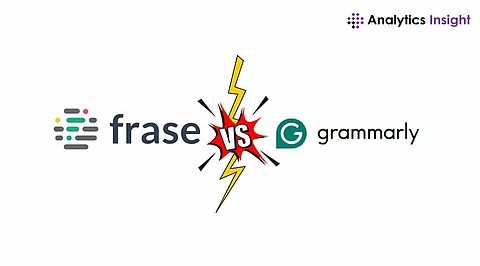

Artificial intelligence writing aid software has been the cornerstone for writers, marketers, and business professionals to steer through 2025's virtual landscape. Frase and Grammarly are class-of-their-own leaders, each expert-niche strong in certain demands.
Frase is specifically meant for content creation and SEO enhancement, whereas Grammarly provides expertise for grammar, style, and clarity check correction. Both of them are discussed on the basis of their characteristics, differences, and applicability in this article to choose the ideal tool for 2025.
Frase positions itself as an all-encompassing platform for content writers and marketers seeking to reign supreme in search engine rankings. Released with a mission to streamline writing and research, it incorporates AI to examine high-performing web content, creating outlines and drafts based on specified keywords. The tool's Content Briefs function aggregates information from the top 20 Google results, providing insights into headings, word count, and questions to answer. This enables writers to write articles optimized for visibility and relevance.
Aside from research, Frase offers an AI editor that recommends sentence expansions, rewording, and keyword insertion. Its ability to produce full drafts from little input—headline or topic- saves time for writers with deadlines. Other tools, like the Question Research module, pull questions from sites like Reddit and Google's People Also Ask, ensuring content aligns with what readers are looking for. For $44.99 per month on the Solo plan as of March 2025, Frase is designed for creators who prioritize SEO and productivity over nitpicking editing.
Grammarly, a pioneer in the AI writing space since 2009, is a leading provider of text-perfecting solutions, helping businesses refine their writing. Known for its robust grammar and spelling corrections, the software identifies errors in real-time on platforms such as Microsoft Word, Google Docs, and browsers through add-ons. It's a US$12-per-month Premium service in 2025, paid on a yearly basis, that delves further, correcting style, tone, and clarity problems, great for refining business emails, reports, or works of art.
The launch of GrammarlyGO in 2024 brought generative AI features to write out text from prompts, although this is secondary to its editing strength. Tone recognition and tweaking capabilities assist in customizing messages for intended audiences, while the plagiarism detector, checking unlimited words in Premium, guarantees authenticity, a godsend for scholars and book publishers. Compatibility extends to desktop applications, mobile keyboards, and more than 500,000 integrations, positioning Grammarly as a jack-of-all-trades editor for finicky revisions.
Frase and Grammarly differ in function and design. Frase accelerates the writing process, doing research, SEO optimization, and draft production better. Its AI is great at generating content rapidly, requiring minimal, if any, revisions for SEO-optimal output. Grammarly, however, specializes in refining, catching minor errors and streamlining texts to read more smoothly with detailed recommendations.
Frase only does rudimentary grammar checks while lagging behind the linguistic depth analysis of Grammarly. Grammarly's generative capabilities, while expanding, are short on Frase's speed of generating content.
Integration is also diverse: Frase natively integrates with WordPress and Google Search Console for SEO workflows, while Grammarly's wide app support is better for cross-platform editing. Pricing captures these balances; Frase's higher premium price is counterbalanced by its one-stop content solution, while Grammarly's low cost is targeted towards editing precision.
Frase is ideal for authors and content writers who want quick, SEO-optimized drafts. Its keyword-based outputs and research tool save human time but sometimes result in dry AI-generated content or need tweaking to have a voice that makes sense. Grammarly stands out at providing error-free, crisp writing, good for professionals and students who focus more on intelligibility than length. Yet its shortfalls in content generation functionality make it less effective in producing large volumes or for SEO planning.
Deciding between Grammarly and Frase depends on writing objectives. Frase is for content writers charged with creating top-ranking blog posts, product descriptions, or marketing copy within time limits. Its SEO orientation aligns with 2025's competitive online marketplace, where prominence is key to success. Grammarly is best for writers polishing existing work: consider business proposals, academic work, or novels, where perfection in execution is paramount.
The Verdict for 2025
No one tool excels for everyone; each is suitable based on priorities. Frase excels for creators starting content from scratch with SEO considerations, providing a smooth journey from research through publication. Grammarly stands out for refining drafts, providing grammatical correctness and stylistic flair. With the growth of AI writing in 2025, combining the two strengths, Frase's speed of creation with Grammarly's refinement, may optimize output quality, albeit based on cost and workflow considerations.
